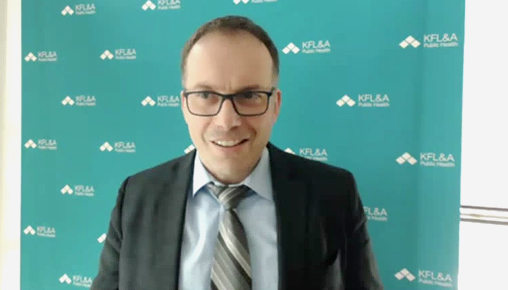Adam Prudhomme
Editor
Hospitalizations due to COVID-19 in the KFLA region continue to decline, reaching a level not seen since the fall.
That stat was among the positive updates KFLA Public Health medical officer of health Dr. Piotr Oglaza shared during a virtual media call on Thursday.
“I have some reassuring news to share with the community and it’s related to our COVID-19 trends in the KFLA region which continue to improve,” said Oglaza. “Local data continues to suggest that the sixth wave is on a gradual decline. Although COVID-19 activity still remains elevated, it is now far below previous peak levels.”
Per cent positivity of tests conducted has dropped below 10 per cent.
“This is a level not seen since early February which we typically assumed as the start of our sixth wave,” said Oglaza. “Our hospitalization rate is now the lowest it has been since early November. And overall the number of active hospitalizations remains stable.”
As of May 24 there were 13 people in hospital due to the virus, three in the ICU and one on a ventilator. The number of new high-risk cases reported was 83, down from an all-time high of 157 reported in early April. Since the start of the pandemic there have been 59 deaths linked to the virus reported in KFLA.
“In 2022 alone, our region, KFLA region, has the lowest COVID-19 death rate in Southeastern Ontario,” said Oglaza. “KFLA Public Health region leads the province in fourth doses and doses among children 5-11 and we are the second highest with the third doses. All of that had a significant impact on the severity and burden of disease of COVID-19 throughout this pandemic but more specifically throughout this last wave.”
Though the numbers are headed in the right direction, Oglaza warned there are still risks for certain pockets of the population.
“The risk of infection and serious outcomes for COVID-19 is greater and has greater impact for some individuals than others and sticking to the key protective activities and actions will remain relevant,” said Oglaza. “Monitoring for symptoms and staying home when sick has always been the cornerstone when preventing respiratory illness. Getting vaccinated for all doses you’re eligible for is a critical message for COVID-19 and this is something that we’ve encouraged and this is something that we are the leader in this province.”
Oglaza was also asked about monkeypox in the wake of the news that 16 cases have been confirmed in Canada.
“This is not a new or novel disease,” said Oglaza. “There were cases of monkeypox that were associated with cases in places in the world where this virus is endemic and occasional human transition and human infection are associated with that exposure to animals. Doesn’t have to be monkeys or primates, it also could be from other animal hosts such as smaller rodents, squirrels for example.”
Oglaza was asked if there would be any recommendations for getting vaccinated against monkeypox.
“It’s typically a mild viral illness,” said Oglaza. “Most people recover after a few weeks. The vaccine that would prevent monkeypox infection is the original smallpox vaccine that can be used also to prevent monkeypox.”

